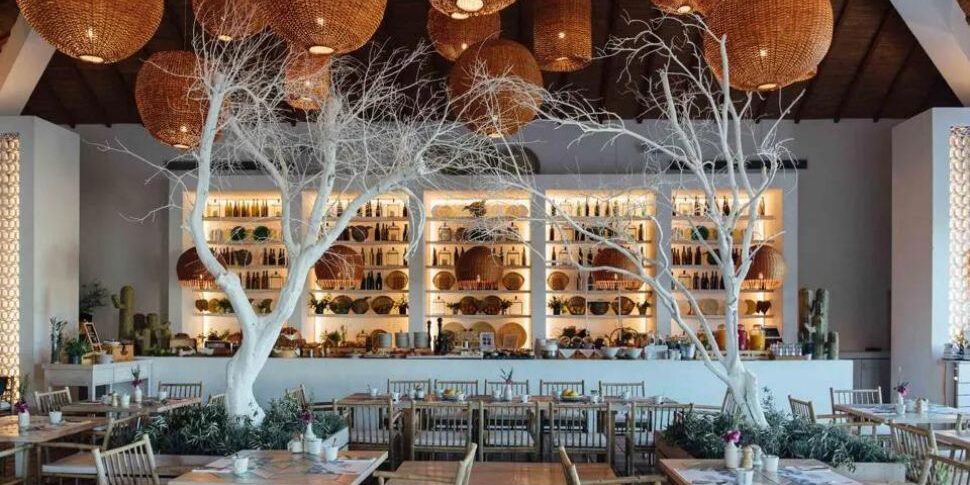This Luxury Hotel Proves There’s More Than Beach To Portugal’s Algarve

There are two things that nearly everyone gets wrong about the Algarve. One is that it begins and ends with the beach. The second is that it’s only worth visiting in the summer.
Both of these ideas are incorrect.
While my Portuguese friends might disagree, winter in the southernmost region of continental Portugal can be genuinely nice. Sure, it rains sometimes, and the sunsets (beautiful as they are) are earlier than ideal. Only the bravest will swim. But many afternoons see temperatures near 70°F—an alfresco lunch might require a sweater, not a jacket—and a softer, slanted light. The crowds are gone. The fireplaces get fired up. The hearty food starts to make sense. (How people enjoy lunching on steaming pots of seafood rice during their summer beach days is beyond me.)
And as for life—and luxury—beyond the cliffs and the waves and the sand, it’s easy to find if you look. There’s a growing interest in gastronomy. Quality wines are being produced. Artisanal crafts live on. And virtually all the best boutique hotels in the region are inland.

A case in point is the recently rebranded Octant Vila Monte (formerly Vila Monte Farm House), a 22-acre property that’s a short drive from the artsy city of Olhão. The hotel project was originally developed by Miguel Guedes de Sousa, who is part of the Amorim family (the wealthiest in Portugal) and went on to oversee the fashionable JNcQUOI group of restaurants and, soon, hotels.
The interiors were the work of Vera Iachia, who collaborated with Andy Warhol and, later, Jacques Granges, who became known in Portugal for his “Comporta cabana” style of relaxed, woven-straw luxury. The most recent renovations and expansions preserved her bohemian, beach-chic vision, from the lime-washed walls and terra-cotta floors to the wicker chairs and macrame wall hangings.
It also updated the 55 rooms, suites and new collection of distinctive suites, a separate adults-only swimming pool, an outdoor chef’s table beside the kitchen garden, a 3,500-square-foot villa (with a famous Hollywood star in residence during my recent stay), and the transformation of an older block of 26 rooms around the orangerie into a family-friendly section. Further plans for 2024 include a full-size spa, summer sunset barbecues beside the pool, a new kids’ area and a tree house. For 2025, they’re aiming to add new rooms with plunge pools.

The renovations are coming along with the Octant rebrand for a subgroup of eight of the top-tier hotels run by Portugal’s Discovery Hotel Management, part of an investment fund that acquires unloved hotels (of recent vintage, not grand old palaces) around the country and brings them back to life. Or, as public relations manager Ana Stilwell says, “DHM buys distressed properties and makes them better every year.”
Those improvements extend beyond the rooms to the guest experience. Stilwell says that Octant—which takes its name from a sailing tool, a nod to Portugal’s navigational history—has two brand pillars. One is what they call a “freedom of luxury,” meaning that amenities like the pools and the gym are open 24/7, and while the breakfast buffet gets taken away at a certain hour, you can get bacon and eggs whenever you want. (Ask for them with the ground, dried caviar that’s on hand in the kitchen, one of the innovations from recent consulting chef Pedro Mendes.)
The other is an interest in all things local, especially in the furnishings in the rooms, ingredients on the plates—many grown onsite, locally caught or raised in the nearly adjacent Ria Formosa—and details in the public spaces and restaurants. Guests can visit the people the hotel concierges call their “local heroes”: artisan craftspeople such as ceramicists, weavers and the cork factory outside Faro that produces placemats and other tableware.

A similar initiative for food is underway across Octant’s hotels in Portugal. While the regular menus emphasize local dishes like seafood rice and garlicky carrot salad, a new partnership goes further. Working with Portuguese food journalist and activist Teresa Vivas, each hotel is inviting regional home cooks for a series of special Como em Casa (“like at home”) culinary events. In the meantime, guests can shop at pop-up artisan markets in the hotel’s gardens, visit the fish market in Olhão with one of the hotel’s chefs, enjoy classic Portuguese one-pot dishes (cataplana seafood stew, clams cooked over fire with salt) for Sunday lunch, or sample wines from local Algarve producers.
And yes, in summer the beach is nearby, and an excursion takes guests to the (somewhat misnamed) Ilha Deserta. But all of that is just a cherry on top—the hotel is inviting any time of year.
See the full news here.
Source: Forbes
